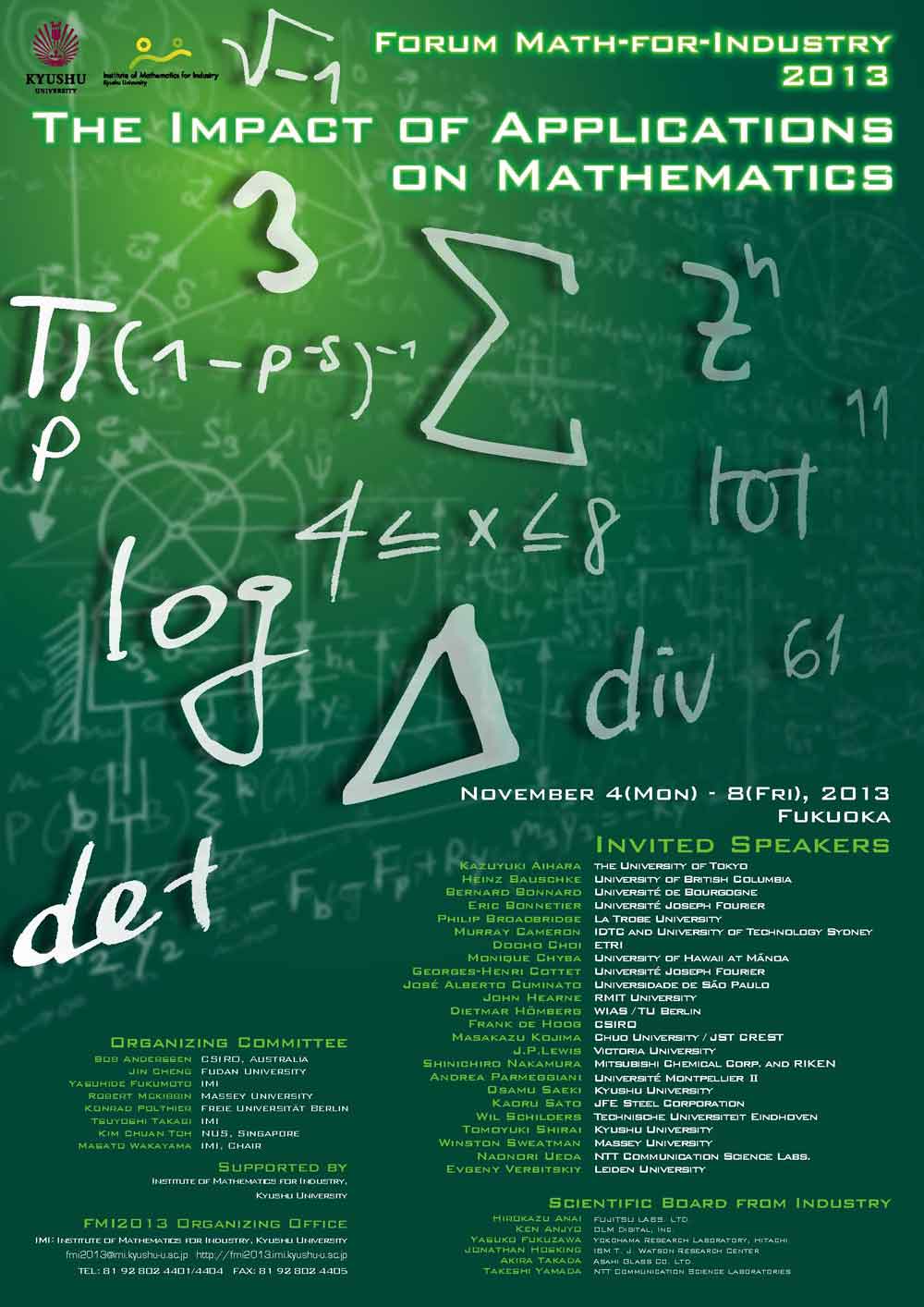CONFERENCE POSTER
COMMITTEE
- Organizing Committee
- Bob Anderssen (CSIRO, Australia)
Jin Cheng (Fudan University)
Yasuhide Fukumoto (IMI)
Robert Mckibbin (Massey University)
Konrad Polthier (Freie Universität Berlin)
Tsuyoshi Takagi (IMI)
Kim Chuan Toh (NUS, Singapore)
Masato Wakayama (IMI), Chair
- Scientific Board from Industry
-
Hirokazu Anai (FUJITSU LABS. LTD.)
Ken Anjyo (OLM Digital, Inc.)
Yasuko Fukuzawa (Yokohama Res. Lab., Hitachi.)
Jonathan Hosking (IBM T. J. Watson Res. Ctr.)
Akira Takada (Asahi Glass Co. Ltd.)
Takeshi Yamada (NTT Comm. Sci. Labs.)

FMI2013 SYNOPSIS
The Impact of Applications on Mathematics
The Forum, in 2013, will focus on "The Impact of Applications on Mathematics". It represents an appropriate framework in which to highlight how real world problems, over the centuries and today, have influenced and are influencing the development of mathematics and, thereby, how mathematics takes up the consequences of such impacts to advance mathematics to the benefit of mathematics and its application. It is this process which underlies not only the key role that "Mathematics-for-Industry" plays in fostering productive and successful interaction between industry personnel and mathematicians, but also the cross-fertilization and collaboration that it stimulates in having mathematics involved with the advancement of science and technology.
The various talks will illustrate different aspect of how, starting with an enquiry or question from industry, there is a logical sequence of conceptualization and model formulation central to the resulting mathematical decision making which focuses on answering the question to the benefit of industry. The question under examination about the industrial problem focuses and drives how the associated mathematics must be unravelled, since there is a non-uniqueness in the ways that a specific mathematical model/construct/equation can be utilized.
Even when the industry problem leads to standard mathematics, there is an "impact". To answer the question raised by the application, the appropriate interpretation of the mathematics within the context of the application must be identified. This is directly reflected in the fact that the same basic mathematical equations arise in quite unrelated applications.
The impact on mathematics from/by applications is universal. If one goes back into the history of mathematics, one finds that practical problems (applications) played a crucial role in its early development. This is true even today for much of mathematical research. Even within pure mathematics this has validity in that one aspect of mathematical research is the identification of (e.g. simpler, constructive) proofs, which unveil the hidden secrets of mathematics and significance of classical results.
The nature of the interaction is aptly summarized in the following comment by V. I. Arnold:
"My best pure mathematics was in applied mathematics and my best applied mathematics was in pure mathematics."
The talks will discuss the following aspects: specific examples of how the answering of a question, coming from industry, engendered new mathematical activity; how the same mathematics is central to the solution of quite different applications; how the answering of an industrial question requires deep thought about the essence mathematically of the application from which it came; how mathematics has built on the mathematics initially coming from the needs of applications.
From a Mathematics-for-Industry perspective, an equally important role of the Form is the choice of topics, which engage and mentor all mathematics students, pure and applied, about the nature of mathematics as real-world and social activities. A key goal is to foster and motivate their professional involvement with industrial mathematics as a source for interesting real-world problems for which new mathematical perspectives are required and from which new research themes may even materialize, as a source for internship topics for students involved with collaborative projects with industry and as a source for research subjects for graduates studying for a higher degree (MSc or PhD). In this way, all mathematics students have their eyes opened to the opportunities for all aspects of mathematics to contribute to the solution of real-world problems in terms not only of assisting industry but also of advancing the consequential impact on the development of new understanding about and opportunities for mathematics.

